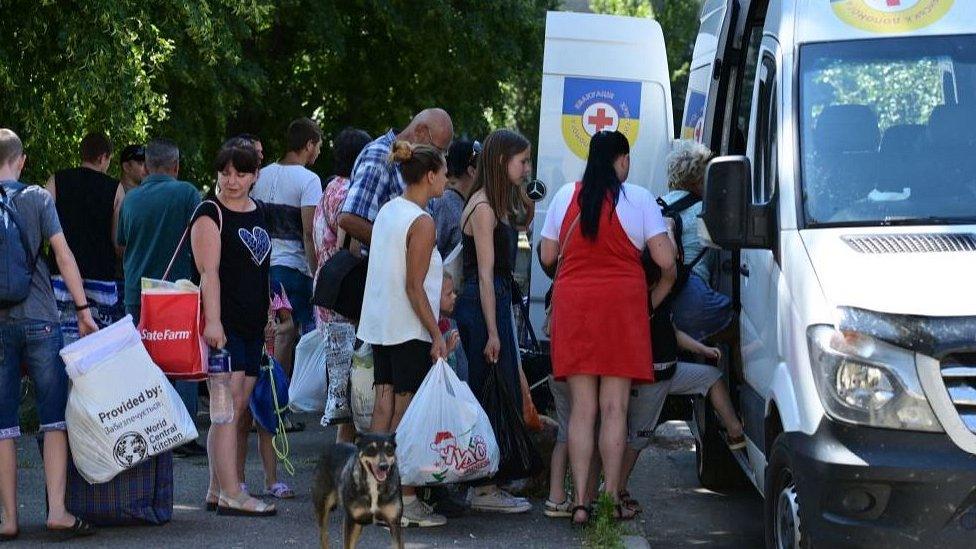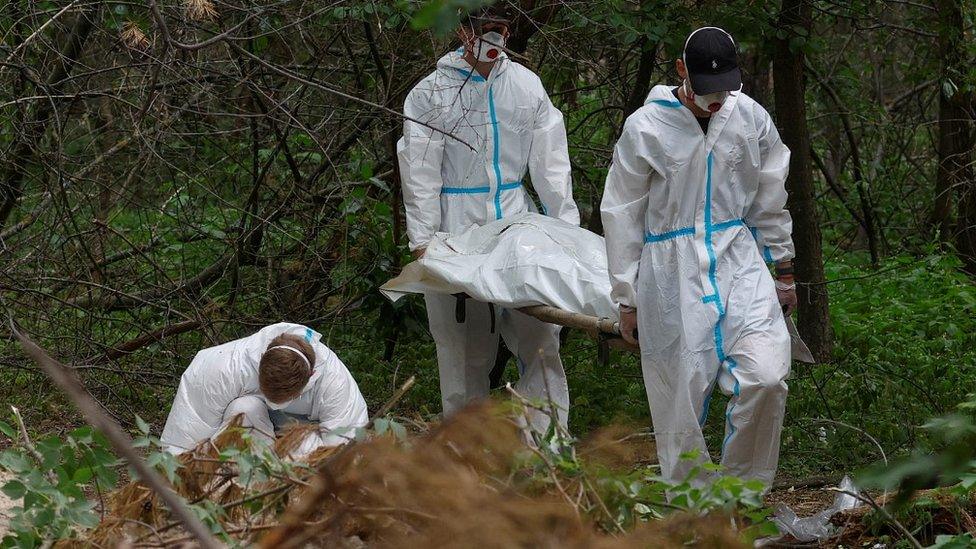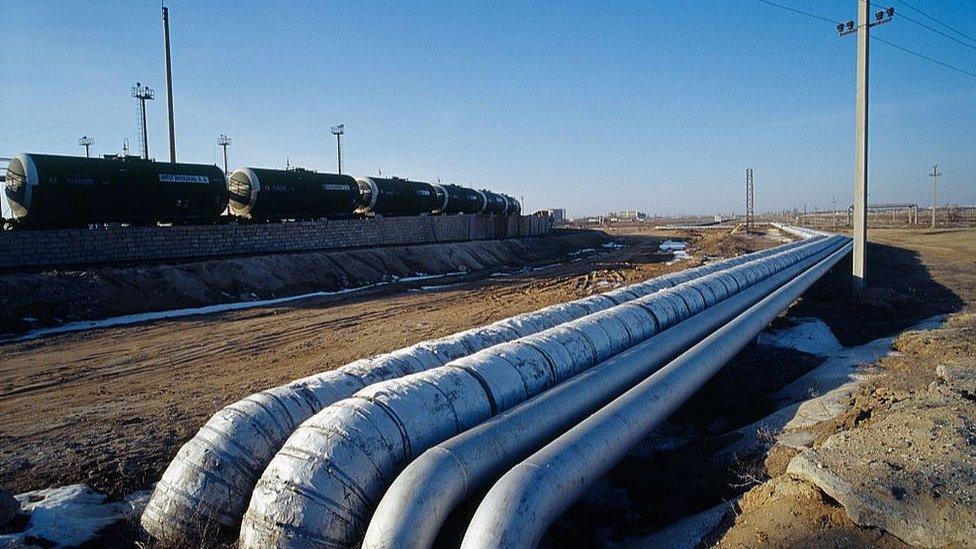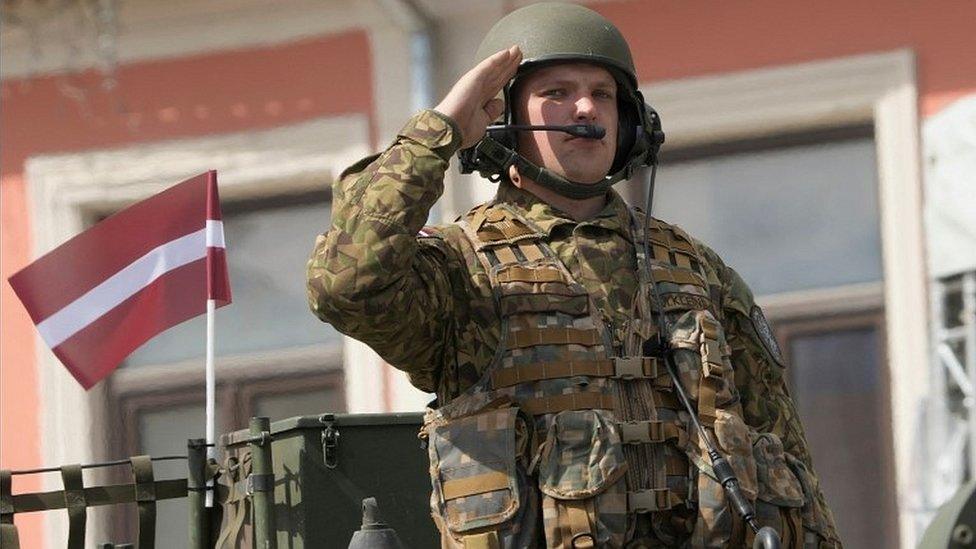Ukraine round-up: Evacuation under fire and new oil tensions
- Published

Slovyansk residents leaving on Wednesday
Residents have been told to leave Ukraine's eastern city of Slovyansk, a day after two people were killed in a Russian attack on a market.
Civilians boarded minibuses on Wednesday morning as Russian forces advanced from the north and east.
Mayor Vadym Lyakh said "we take people out every day" and "about 23,000 residents remain". "Many of the evacuees were taken by bus to the city of Dnipro, further west."
He said the city, previously home to more than 100,000 people, "is well fortified".
With Russian forces now controlling the nearby Luhansk region, UK defence intellligence says Slovyansk is likely to be the next focus of the fight for Donbas, the industrial area comprising Luhansk and Donetsk.
Russian forces also continued shelling Mykolaiv, a strategic city in the south where Ukraine is blocking an advance on the port city of Odesa.

Family broken by missile strike
Ukraine war: The Russian woman rescued from a Kyiv bomb site
A Russian-Ukrainian family has been irrevocably split by the war, after a missile attack on Kyiv injured Russian-born Ekaterina Volkova and killed her Ukrainian husband.
The BBC spoke to their relatives, who called the strike on an apartment block unforgivable. Ekaterina and her daughter Zhenya were pulled from the rubble, but Oleksiy died, leaving the family grief-stricken.

Ukraine alleges thousands of war crimes

Ukrainians have resorted to burying war victims in mass graves
Ukraine's prosecutor general, Iryna Venediktova, has told the BBC she is investigating more than 21,000 war crimes and crimes of aggression allegedly committed since the start of Russia's invasion.
She acknowledged that many trials would have to be held in absentia. Despite that, she said: "Russian militaries who decided to kill civilians, to torture civilians, to rape civilians, they should understand that it's only a question of time when they all will be in court".
She said she was receiving reports of 200-300 war crimes a day.
There has been international condemnation of Russian attacks on civilian areas. Ukrainians, as well as foreign journalists and aid workers, have documented atrocities by Russian troops, such as indiscriminate shelling of apartment blocks. Russia denies targeting civilians and accuses Ukraine of staging "provocations".

Russia-Kazakhstan tensions over oil

Kazakh oil is exported via pipeline from the Caspian Sea region
A Russian court has ordered a suspension of Kazakh oil exports to Western markets for a month.
Russia controls the Black Sea oil terminal at Novorossiisk, where tankers load up with oil sent via pipeline from the Tengiz field in Kazakhstan.
The Caspian Pipeline Consortium (CPC) operates the pipeline and is appealing against the ruling. The court found "documentary violations" in the CPC's oil spill response plan.
Several Western oil giants have stakes in the CPC, including Chevron and Mobil.
Russia's oil and gas exports are now restricted under Western sanctions, so producers like Kazakhstan are much in demand.
Kazakhstan provided 6% of EU oil imports in 2020, and Russia 29%, the EU Commission says. The CPC carries 80% of Kazakh oil exports to Europe.
Kazakh President Kassym-Jomart Tokayev has publicly refused to recognise the Donetsk and Luhansk "people's republics" declared by Russia in eastern Ukraine.
He has also suggested Kazakhstan could boost its oil exports to the EU.

Latvia to reintroduce military conscription

Latvia has a small army and wants conscripts to boost its strength
Latvia plans to reintroduce national military service, which it scrapped in 2007. For a transitional five years it will be voluntary, then compulsory - a system similar to Sweden's.
The move, announced by Defence Minister Artis Pabriks, will bring Latvia into line with its Baltic neighbours Estonia, Lithuania and Finland, which have military conscription.
Men aged 18-27 will be recruited and paid up to €400 (£342; $408) a month, for 11 months of duty. Their service will also turn them into military reservists. Service will remain voluntary for women.
Latvia, a member of both the EU and Nato, has just 7,500 active duty soldiers and National Guards, backed by 1,500 Nato troops. The goal is to train an extra 7,000 conscripts annually.
"The greater the number of people with military training, the less likely it will be that Russia will want to direct its military aggression against Latvia," Mr Pabriks tweeted.
Latvia has a population of about 1.8 million, a quarter of whom are ethnic Russians.

War in Ukraine: More coverage
